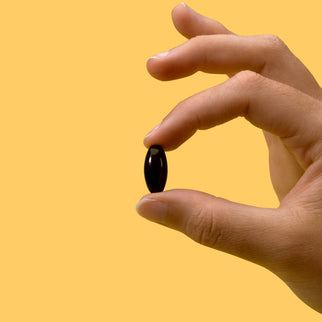In the journey towards optimal heart health, understanding cholesterol is essential. Cholesterol is a key player in the cardiovascular system, and it serves both as a building block for cells — and a potential health risk if not managed.
One method that’s gaining popularity when it comes to supporting normal cholesterol levels is omega-3 fatty acids. There has been a noticeable uptick in the popularity of fish oil supplements recently as more people are embracing their potential effects.
Today, we’re diving into the details of fish oil and cholesterol to determine exactly how they’re linked.
What Is Cholesterol?
Cholesterol is a complicated compound, as it’s something of a dual-natured entity in our bloodstream. On the one hand, it aids in building robust and healthy cells within our bodies — but on the other, having too much of it can escalate into serious health risks.
To properly understand cholesterol, let’s break it down:
LDL (Low-Density Lipoprotein)
LDL cholesterol primarily enters our blood via our diet. Foods high in trans and saturated fats contribute to its accumulation. LDL is commonly referred to as “bad” cholesterol because it’s known to increase the risk of heart disease, high blood pressure, heart attack, and stroke.
When LDL cholesterol levels are too high, it can build up on the walls of your blood vessels. Once the plaque becomes thick enough, it can elevate the risk of atherosclerosis and blockages developing in your arteries, setting the stage for cardiovascular and coronary events. High levels of LDL can contribute to high levels of remnant cholesterol.
HDL (High-Density Lipoprotein)
HDL cholesterol is on the other side of the spectrum and functions as the “hero” in the world of cholesterol. HDL is considered to be the “good” cholesterol, as it plays a protective role within the body.
For example, HDL plays a role in escorting LDL cholesterol away from arteries and towards the liver. When the LDL arrives at this preferred destination, it’s broken down and removed from the body. So, while HDL cholesterol is technically a type of cholesterol, it functions as a counter to high cholesterol levels that could otherwise pose threats to heart health.
Triglycerides
Triglycerides are a type of lipid (fat) found within the blood. The body naturally converts calories that it doesn’t use right away into triglycerides, which are then stored within your fat cells.
When your body needs energy during fasting periods, hormones release triglycerides into the bloodstream to be used for fuel. While that’s beneficial during certain times, it can be detrimental when working in tandem with high LDL or low HDL.
What Is Fish Oil?
Fish oil, often delivered via a capsule, is a common supplement derived from the tissues of fatty fish such as mackerel, sardines, trout, salmon, and herring.
Fish oil is primarily popular for its rich concentration of omega-3 fatty acids. For many, fish oil supplements serve as their primary source of omega-3, especially when dietary servings of omega-3 are limited or inconsistent.
What Are Omega-3 Fatty Acids?

In the world of nutrients, omega-3 fatty acids stand out for their range of potential health benefits. As polyunsaturated fatty acids, they’re crucial in a variety of bodily functions.
Here are the different types of omega-3 and some of the roles they play within our bodies:
DHA (Docosahexaenoic Acid)
DHA is the crown jewel in the realm of omega-3s. Sourced from oily fish, krill, and algae, DHA works to support brain and eye wellness.
Plus, it plays a key role in supporting cholesterol and triglyceride levels that are already within the normal range.
EPA (Eicosapentaenoic Acid)
Fish oil is also rich in EPA, the second form of true omega-3. This type of omega-3 helps ease feelings of tension and tenderness, supporting the smooth functioning of bodily systems.
EPA works with DHA to offer a range of benefits when it comes to heart health and overall wellness.
ALA (Alpha-Linolenic Acid)
ALA, predominantly found in plant sources like flaxseed, chia, canola, and soybean, offers benefits, too — however, ALA is a precursor to DHA and EPA, which are the only true forms of omega-3.
It's worth noting the body's conversion of ALA to these potent forms of omega-3 is limited. WhileALA can still offer some health benefits, it’s not quite up to par with DHA and EPA.
How Do Omega-3 Fatty Acids Influence Cholesterol?
The intersection of omega-3 fatty acids and cholesterol management is a dynamic and evolving area of research.
Several clinical trials and studies have shed light on the benefits of omega-3s heart health:
- Support healthy levels of triglycerides: Omega-3s may help support proper fatty acid oxidation processes, which may help support healthy triglyceride levels.
- Support proper levels of HDL cholesterol: Remember the “good” cholesterol we discussed earlier? Omega-3s may help support levels of HDL cholesterol that are already in the normal range, working to support your heart health as a whole.
- Support levels of remnant cholesterol already within the normal range: While the effects of omega-3s on LDL cholesterol (the “bad” cholesterol) are a bit nuanced, there is evidence suggesting omega-3s may be able to support remnant cholesterol levels that are already within the normal range.
The search for true, sustainable sources of omega-3 often ends at fish oil — but as modern nutrition sciences advance, there's a shift on the horizon.
At the center of this shift is iwi life. At iwi life, we’re committed to bringing you high-quality, sustainable omega-3 supplements made from Nannochloropsis algae.
What Are Other Ways To Support Normal Cholesterol Levels?
Understanding cholesterol is about more than numbers and metrics — it’s a way to embrace a lifestyle that helps safeguard against cardiovascular risk factors.
Here a few ways to support a healthy heart and maintain healthy cholesterol levels:
- Maintain a Healthy Diet: Filling your plate with fruits, vegetables, and lean proteins (and fewer saturated and trans fats) can help keep your heart healthy.
- Eat More Fiber: Think of soluble fiber as your digestive system's friend, working to reduce cholesterol absorption. Whole grains, fruits, and legumes are fiber-rich champions that can help you maintain healthy total cholesterol.
- Get Regular Exercise: Committing to an active, heart-healthy lifestyle can support your “good” cholesterol while keeping the “bad” in check.
What Are the Side Effects and Considerations When Choosing Omega-3 Supplements?
Every wellness journey is unique, and this holds true when choosing omega-3 supplements.
Traditional fish oil supplements, while beneficial, occasionally come with side effects of bad breath or digestive discomfort. In more extreme cases, it might result in heartburn, nausea, or diarrhea. iwi life's plant-based omega-3 supplements, derived from algae, sidestep many of these concerns, offering a smoother wellness journey.
The Takeaway
Navigating the vast seas of dietary supplements can feel overwhelming. Yet, the compass guiding this journey is understanding: understanding the source, the process, and the potential benefits.
iwi life helps you harness the power of omega-3s without compromising on quality, ingredients, or the planet's well-being. For anyone ready to make a plant-based pivot, step into the world of iwi life supplements.
Sources
Physiology, Cholesterol | NCBI Bookshelf
Global Fish Oil Market Is Expected to Value Around US$ 3.62 Billion by 2030 | Globe News Wire
Overview of Omega-3 Fatty Acid Therapies | PMC
Top 5 Lifestyle Changes to Improve Your Cholesterol | Mayo Clinic



















